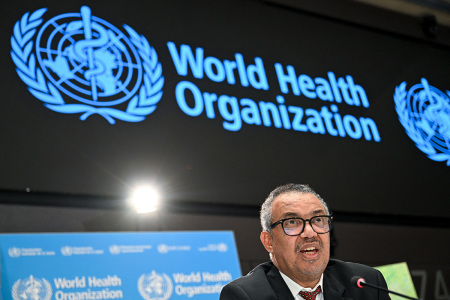WHO taps trans activist, ex-prostitute who calls sex work 'empowering' to join advisory board

The World Health Organization has proposed that a man who identifies as female and is a former prostitute with HIV who once described sex work as “empowering” serve on its expert advisory group on trans health.
Erika Castellanos is the executive director of the advocacy group Global Action for Trans Equality, where he previously served as the director of programs after joining the organization in 2017.
The trans-identifying individual is included on a list of proposed members for The WHO’s Guidelines Development Group on the Health of Trans and Gender Diverse People. The list contains the names and biographies of proposed members as of January.
According to Castellanos’ biography, the GATE director from Belize now resides in the Netherlands. In 2015, he completed a certificate program on LGBTI health research at the University of Pittsburgh, and in 2009, Castellano founded a network for people living with HIV in Belize. He also co-founded the first trans network in the country, according to his biography.
The WHO did not immediately respond to The Christian Post’s request for comment but announced in June that the purpose of its new guidelines is to “provide evidence and implementation guidance on health sector interventions aimed at increasing access and utilization of quality and respectful health services by trans and gender diverse people.”
The guideline’s five areas of focus consist of the “provision of gender-affirming care,” which includes opposite-sex hormones and training for providers who promote sex changes. The other areas of focus include the “provision of health care for trans and gender diverse people who suffered interpersonal violence based in their needs; health policies that support gender-inclusive care, and legal recognition of self-determined gender identity.”
On his website, Castellano outlined his experience growing up in Belize and finding himself by pretending to be other people, such as Lucia Mendez, a Mexican pop singer and actress. The trans activist stated that he had always been feminine and was put on testosterone as a result and received counseling from a doctor and local priest.
As a young adult, Castellano migrated to Mexico, and one day, he saw a group of men who identified as women. After the group took him in, Castellano started prostituting himself on the street, according to the activist’s website.
“Sex work was the most empowering thing that ever happened to me. It gave me autonomy and dignity,” Castellano stated. “I had money to buy food to pay for a roof above my head, and I was in control.”
“This is how I survived for many years of my early adult life,” he explained. “As a summary of those years, I used drugs, ended up in prison, and moved from city to city trying to find a home.”
In 1995, Castellano received an HIV diagnosis and was told that he had six months to live. When he didn't die after six months nor two years later, Castellano decided to become involved with activism.
According to Castellano’s biography page on the International AIDS Society’s website, the activist first expressed a desire to stop dressing like a boy when he was 8 years old. His parents attempted to help him with his gender confusion by taking him to a priest and seeking medical treatment for gender dysphoria.
As CP previously reported, England’s National Health Service warned doctors in October 2022 against encouraging young people who express confusion about their gender to socially transition during what might be a "transient phase."
In June, the NHS also announced new interim guidelines for treating children with gender dysphoria, stating that it would only commission puberty-suppressing hormones as part of clinical research.
Samantha Kamman is a reporter for The Christian Post. She can be reached at: samantha.kamman@christianpost.com. Follow her on Twitter: @Samantha_Kamman





















